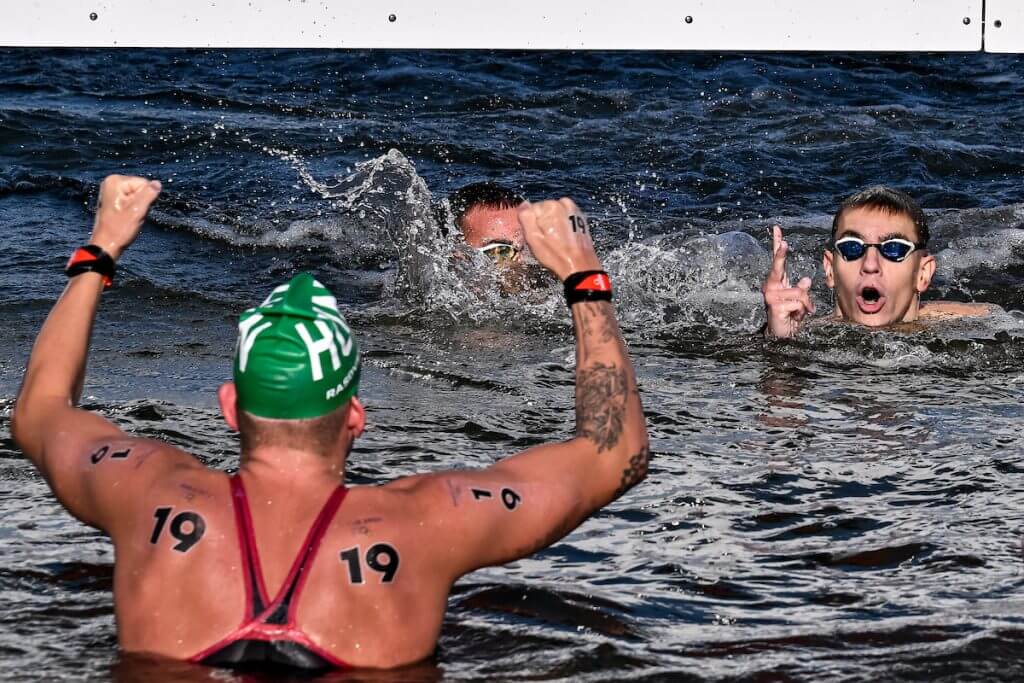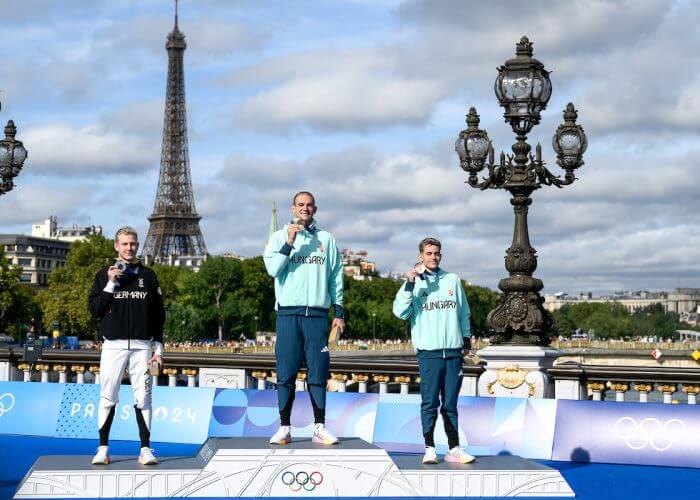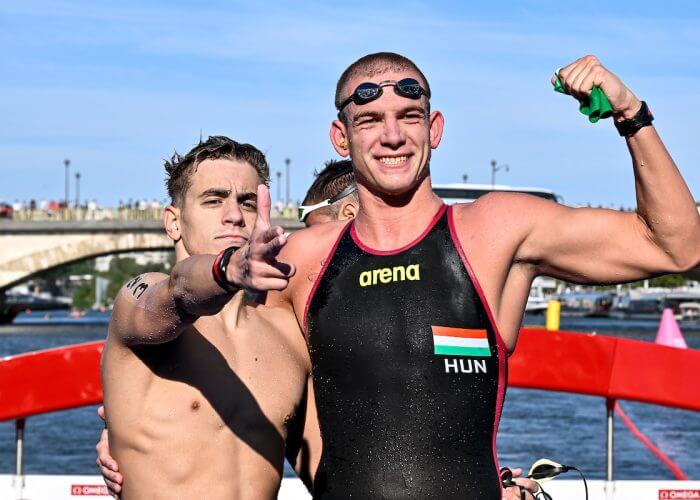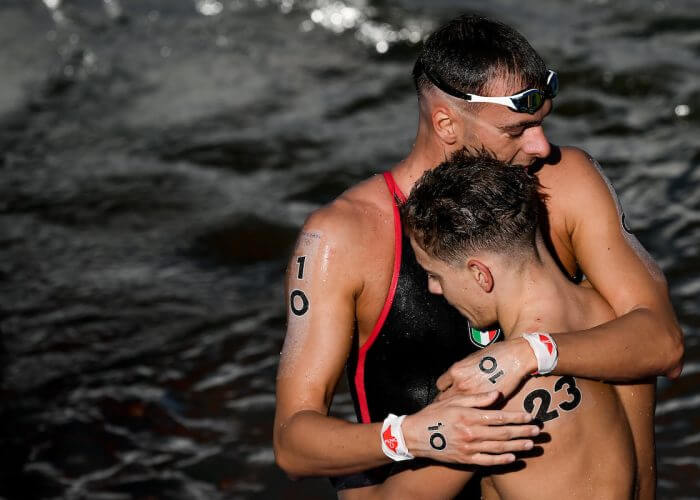Paris Olympics: Kristof Rasovszky Adds Olympic 10k Gold To World Title As Hungary Enjoy 1-3 Finish

Paris Olympics: Kristof Rasovszky Adds Olympic 10k Gold To World Title As Hungary Enjoy 1-3 Finish
Kristof Rasovszky of Hungary added the Olympic title to his world crown with victory in the 10k at Paris 2024.
Rasovszky was in the top two throughout and came home in 1:50:52.7 to upgrade Tokyo silver to gold three years on.
Oliver Klemet of Germany was second, 2.1secs behind in 1:50:54.8, with David Betlehem edging Domenico Acerenza in a sprint finish in 1:51:09.0 to 1:51:09.9 to make it two Hungarians on the podium.
It’s the first time since marathon swimming was introduced to the Olympic programme that two men from the same country have shared the podium although Great Britain pair Keri-anne Payne and Cassandra Patten enjoyed a 2-3 in the women’s race at Beijing 2008.

Oliver Klemet, Kristof Razovszky & David Betlehem: Photo Courtesy: Giorgio Scala / Deepbluemedia
Logan Fontaine was the first Frenchman home (1:51:47.9) ahead of Great Britain’s Hector Pardoe who finished sixth in a sprint finish with Marc-Antoine Olivier in 1:51:50.8 to 1:51:50.9.
Reigning champion Florian Wellbrock was eighth after spending much of the race trading the lead with Rasovszky with Tokyo bronze medallist Gregorio Paltrinieri one place back in ninth.
Twenty-five of the 29 men who dived into the River Seine at Pont Alexandre III completed the race. It was all over for Emir Batur Albayrak before the halfway point with the Turkish swimmer, the second-youngest in the field having turned 17 in June, withdrawing in the latter stages of lap three.
Carlos Garach Benito of Spain joined him on the fourth lap followed by Guilherme Costa of Brazil and Namibia’s Phillip Seidler of Namibia.
Daniel Wiffen, winner of the 800 free and 1500 bronze medallist, declared his open water retirement after finishing 18th on his marathon debut.
Kuzey Tuncelli, who set a WJR in the 1500, came in 23rd before saying: “It was great…….but I don’t think I’ll do it again.” now for a two-week break before the 16-year-old returns to training ahead of the World Short-Course Championships in Budapest.
Training Together In The Danube
The River Danube 0riginates in Germany before flowing for close to 3,000km and passing through capitals Vienna, Bratislava, Budapest and Belgrade.
On three Saturday mornings in July, Rasovszky and Betlehem would train in the river as it passes through the town of Százhalombatta – around 33km from Budapest – along with Bettina Fabian, who came fifth in the women’s race.
A faster-flowing river than the Seine, it enabled the trio to overcome any fear factor and allowed them to train in a current with the field going out with the current and back against it.
“It was a really good preparation for how to swim in a river and made a really good advantage for us,” said Rasovszky.
Asked if the way the Hungarians mastered the art of crossing the current as they swam around the buoys at the turning points at each end of the six 1.67km loops of the course, had been significant in terms of outcome, Rasovszsky said: “It is, of course. It’s really hard, in the turning down [against the current] because the current is bringing [forcing] us away from the buoys. So we trained for this really hard at home in Hungary. In the Danube we learned that you have to turn more back [in the direction you came from] than you expect and swim not just in the direction of the next buoy but probably back towards the finish [or opposite end of the race course to the turning point being navigated].
“So yeah, it’s different than in a sea or in a lake, when you turn 90 degrees and you are in a good position. Here, you had to turn like 130 to be [heading] in the right direction. And it was really the same thing at home [in the Danube], so we were really prepared for this, prepared to make a bigger turn than you would expect to [have to] make.”

David Betlehem & Kristof Rasovszky: Photo Courtesy: Giorgio Scala / Deepbluemedia
Betlehem hadn’t wanted to compete in the Seine because of the water quality which had been an issue ever since the cancellation of the test event in August last year. Scrutiny intensified in the build-up especially with the cancellation of training in the river on Tuesday.
His partner Fabian fared well in the women’s event which she followed with a drink of Palinka – a strong Hungarian brandy – and coke, after which he changed his mind.
“I didn’t want to do it because of the water quality,” he said. “But after the women’s race, like nobody was sick. My girlfriend swam and she was OK, So I was like, ‘OK, nobody will care about the water quality now. We need to race. We need to win a medal.’”
“It was a very tactical race but we prepared for this at home,” added Betlehem. “We knew it would be pretty hard – the way down was easier when the water flowed with us, but it was choppy on the way back. It was hard to pass people because everybody was going to the wall, but in the end I was able to pass Domenico on the inside, so I am very happy.”
The last couple of months have represented a real breakthrough on the senior stage for Betlehem.
The 20-year-old claimed his first individual medal at a major senior international with 10k bronze at the European Aquatics Championships in Belgrade in June plus gold in the 5k and relay events before admitting it had been a long journey and one during which he’d been made to learn many lessons.
The two men share a coach in Laszlo Szokolai and train together in Veszprem. In Belgrade he referred to Rasovszky as “big bro Raso” and on Friday he said: “On the last lap I was looking for Kristof, who was leading, and thinking, ‘I want to be on that podium together’. I am very proud of us. I can’t be more happy right now.”
Klemet made it three swimmers from Bernd Berkhahn’s training group to claim a medal in the Seine following Sharon van Rouwendaal and Moesha Johnson’s gold and silver in the women’s race.
“We have a great coaching team, with Bernd Berkhan preparing us really well for this event as well as for the pool,” he said. “We are doing a good job, doing a high volume of work, and we analyse the current pretty well.”
He added: “We did a really good job in the preparation. In the pool, Lukas Martens is training with us. He won gold in the 400m (freestyle). Isabel Gose won a bronze in the 1500m. So now we have our German medal set together. He just prepared us really well with the high-volume practice, analysing the venue, analysing the current, where’s the best way to swim. I think it paid off. He’s just a really great coach.”
How The Race Unfolded
Wellbrock and Rasovszky went to the head of the field at the off, the pair going stroke for stroke along the bankside on the first lap followed by Paltrinieri, Olivier and Acerenza.
Wellbrock was first through lap one in 17:04 followed by Paltrinieri, Rasovszky, Klemet and Anathasios Kynigakis of Greece.
Rasovszky took over pole position, leading through the end of lap two and taking a drink at the feeding station before he accelerated and opened up a gap on the chasing group.
Wellbrock, however, led the response and although the Hungarian was ahead at the halfway point, the German reclaimed the lead in the early stages of lap four.

Gregorio Paltrinieri & Kuzey Tuncelli: Photo Courtesy: Giorgio Scala / Deepbluemedia
Back came Rasovszky with the pair occupying the top two slots into the penultimate lap as the Hungarian charged once more, attempting to put clear water between him and the rest.
While Rasovszky continued at the head of the field, Wellbrock dropped well back, overhauled as the field hugged the bank on the second half of lap five.
Rasovszky went into the final lap in pole position, closely followed by Klemet, Paltrinieri, Betlehem and Acerenza with Wellbrock seventh.
By the final buoy, Rasovszky had broken away with Klemet with a sizeable gap to a four-strong group of Acerenza, Paltrinieri, Betlehem and Hector Pardoe.
However, by the time the swimmers had made their way over to the bank, the deficit had been greatly reduced with the italian duo in striking distance.
Coming through Pont des Invalides for the final time and the front two had pulled away once more with the Hungarian extending his lead into the finishing chute for victory ahead of the German.
Behind them, Betlehem and Acerenza were going stroke for stroke with the former getting the touch by 0.6.

- EVENT PAGE
- SCHEDULE
- VENUE
- STREAMING INFO
- DAY 1 PRELIMS RESULTS
- DAY 1 FINALS RESULTS
- DAY 2 PRELIMS RESULTS
- DAY 2 FINALS RESULTS
- DAY 3 PRELIMS RESULTS
- DAY 3 FINALS RESULTS
- DAY 4 PRELIMS RESULTS
- DAY 4 FINALS RESULTS
- DAY 5 PRELIMS RESULTS
- DAY 5 FINALS RESULTS
- DAY 6 PRELIMS RESULTS
- DAY 6 FINALS RESULTS
- DAY 7 PRELIMS RESULTS
- DAY 7 FINALS RESULTS
- DAY 8 PRELIMS RESULTS
- DAY 8 FINALS RESULTS
- DAY 9 FINALS RESULTS



